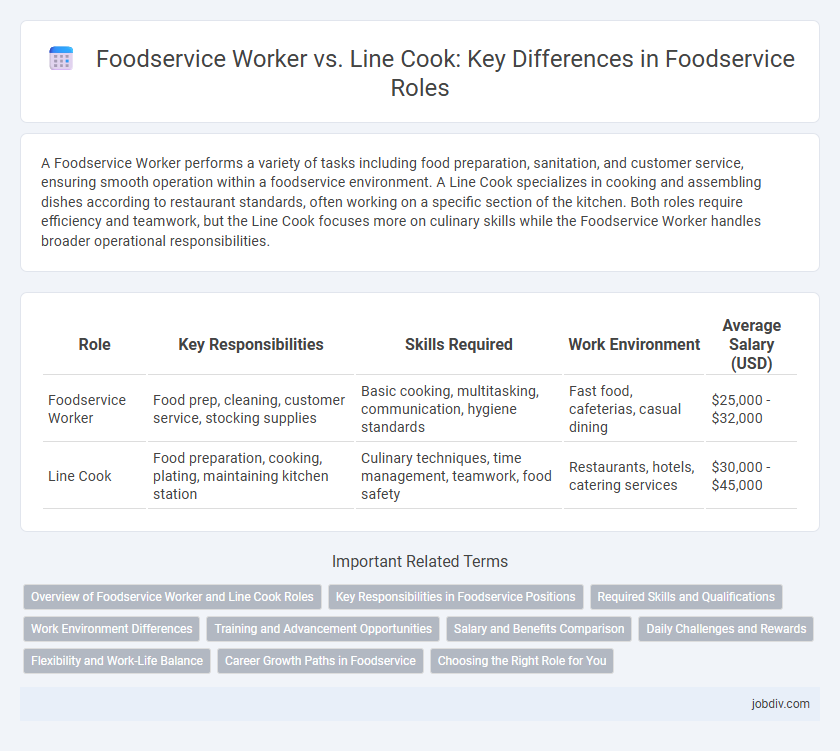A Foodservice Worker performs a variety of tasks including food preparation, sanitation, and customer service, ensuring smooth operation within a foodservice environment. A Line Cook specializes in cooking and assembling dishes according to restaurant standards, often working on a specific section of the kitchen. Both roles require efficiency and teamwork, but the Line Cook focuses more on culinary skills while the Foodservice Worker handles broader operational responsibilities.
Table of Comparison
| Role | Key Responsibilities | Skills Required | Work Environment | Average Salary (USD) |
|---|---|---|---|---|
| Foodservice Worker | Food prep, cleaning, customer service, stocking supplies | Basic cooking, multitasking, communication, hygiene standards | Fast food, cafeterias, casual dining | $25,000 - $32,000 |
| Line Cook | Food preparation, cooking, plating, maintaining kitchen station | Culinary techniques, time management, teamwork, food safety | Restaurants, hotels, catering services | $30,000 - $45,000 |
Overview of Foodservice Worker and Line Cook Roles
Foodservice workers perform a broad range of tasks including food preparation, customer service, and sanitation to support efficient restaurant operations. Line cooks specialize in preparing meals by following recipes and managing specific stations such as grill, saute, or fry areas within the kitchen. Both roles are essential in the foodservice industry, with foodservice workers providing versatile support and line cooks focusing on culinary expertise and food quality.
Key Responsibilities in Foodservice Positions
Foodservice workers handle a wide range of duties including food preparation, customer service, and maintaining cleanliness in the kitchen or dining area, ensuring smooth daily operations. Line cooks specialize in cooking specific menu items, managing food stations, and maintaining ingredient inventory to deliver consistent quality and timely service during meal periods. Both roles require strong teamwork and adherence to food safety standards to optimize kitchen efficiency and guest satisfaction.
Required Skills and Qualifications
Foodservice workers require strong customer service skills, basic food handling knowledge, and the ability to multitask in fast-paced environments. Line cooks need advanced culinary techniques, experience with food safety regulations, and proficiency in operating kitchen equipment. Both roles demand teamwork, stamina, and attention to detail to ensure quality and efficiency in food preparation and service.
Work Environment Differences
Foodservice workers typically operate in diverse settings such as cafeterias, catering events, and fast-casual restaurants, adapting to varying customer volumes and service styles. Line cooks primarily work in structured kitchen environments within sit-down restaurants or hotels, focusing on station-specific food preparation under high-pressure conditions. The work environment for line cooks demands precise timing and coordination, while foodservice workers often engage in multitasking across broader service roles.
Training and Advancement Opportunities
Foodservice workers often receive on-the-job training focused on basic kitchen tasks and customer service, while line cooks undergo more specialized culinary training emphasizing food preparation techniques and kitchen station management. Line cooks have clearer advancement opportunities to supervisory or chef roles due to their refined skills and knowledge of menu execution. Foodservice workers aiming for career growth benefit from gaining culinary certifications or cross-training in specific kitchen operations to transition into line cook positions.
Salary and Benefits Comparison
Foodservice workers typically earn an average hourly wage of $12 to $15, while line cooks command higher pay, often ranging from $14 to $18 per hour due to specialized culinary skills and food preparation responsibilities. Benefits for line cooks frequently include health insurance, paid time off, and opportunities for career advancement, which are less commonly provided at entry-level foodservice worker positions. Salary growth potential is stronger for line cooks as they gain experience, often leading to supervisory roles and increased earnings.
Daily Challenges and Rewards
Foodservice workers face daily challenges like managing high customer volumes and maintaining consistent quality under pressure, while line cooks must execute precise cooking techniques and coordinate timing across multiple dishes. The rewards for foodservice workers include developing strong interpersonal skills and gaining broad operational knowledge, whereas line cooks benefit from honing culinary expertise and receiving direct recognition for their creative contributions. Both roles demand resilience, teamwork, and adaptability, crucial for thriving in fast-paced kitchen environments.
Flexibility and Work-Life Balance
Foodservice workers often enjoy greater flexibility with varied shifts and roles, adapting to different tasks throughout the day, which can lead to improved work-life balance. Line cooks typically have more structured hours focused on food preparation during specific mealtimes, resulting in less schedule variability. This difference makes foodservice workers better suited for those seeking flexible hours, while line cooks benefit from consistent, predictable work routines.
Career Growth Paths in Foodservice
Foodservice workers often begin in entry-level roles with opportunities to gain foundational skills and advance into specialized positions like line cooks, who focus on food preparation and kitchen efficiency. Line cooks typically progress toward supervisory roles such as sous chef or kitchen manager, leveraging culinary expertise and leadership abilities. Career growth in foodservice emphasizes skill development, experience, and certifications, enabling workers to climb from general support roles to advanced culinary professions.
Choosing the Right Role for You
Foodservice workers handle diverse tasks such as customer service, food preparation, and cleaning, suitable for those seeking varied responsibilities and entry-level positions. Line cooks specialize in cooking specific menu items in a fast-paced kitchen environment, ideal for individuals focused on culinary skills and consistency. Assessing your strengths, career goals, and preferred work pace helps determine whether a broad foodservice role or a focused line cook position fits your professional path.
Foodservice Worker vs Line Cook Infographic

 jobdiv.com
jobdiv.com